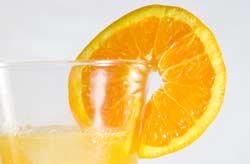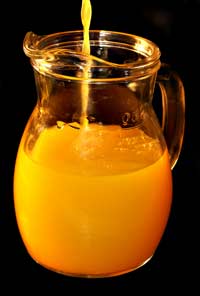What is the Difference Between Pasteurized and Fresh Juices
 The vibrant flavor of freshly squeezed juice is without comparison.
The vibrant flavor of freshly squeezed juice is without comparison.
In order to obtain a prolonged shelf life, the bottled juices must be pasteurized. It is a fairly certain thing. Correct me if I am wrong, but I think that all juices have to be pasteurized if they are to be bottled. Let us see what the impact of this procedure is on the potential health benefits of the juices?
Pasteurized fruit and vegetable juices have to be boiled to protect the foods against bacterias and other harmful organisms. Along with it, the enzymes and other beneficial nutrients are also destroyed.
I understand the need to ensure that the juices are microbiologically safe foods when sold in a store. I really do. But what happens for instance if you are fasting or you are on a juice only diet?
If you are fasting, these juices will be your only source of nourishment. They might be tasty and colorful, but they will be poor in enzymes and vitamins. You need to take live foods to sustain the proper functioning of your organism. Live foods are full of useful substances, as opposed to thermally treated juices where the nutrients have been destroyed.
Some pasteurized juices contain added sugar and water, but even if they are 100 percent natural, they cannot compare to the freshly squeezed juices. The taste is hardly ever close to the natural juices. A freshly squeezed juice will make you experience its live, vibrant substance as it goes down your throat. In my opinion, there is no match for that taste.
Fresh apple juice possesses similar color to that of an apple. When you cut the apple, its flesh is initially white, only to turn brown after a short period of time. This color change is an indication of oxidation – a process where many of the vitamins and live nutrients change their composition as well after being exposed to air. If the mere exposure of these nutrients to air and light is enough to alter them, what can we say about the more drastic procedures? And what do you think, what is the color of the pasteurized juices?
There can also be found juices that are not pasteurized. They are usually sold in plastic jugs. There is a reason behind it. After some time the content of the jug will start to expand. Owing to the fact that that the process of fermentation has begun, the juice increases its volume. Sometimes the term “cider” is used to denote these fresh (unpasteurized) juices. Fresh squeezed juice is almost always sold in plastic jugs.
If you need to consume pasteurized juices, you should know that you won’t receive the full range of benefits. I use them from time to time, and I have no illusion that they have much of a health value. However, if you intend to shift your eating habits toward a more healthy eating (and drinking) style, there is hardly any substitute for preparing your own fresh homemade fruit or vegetable juices.



We have a juice factory and we do not boil our juices under any circumstance. We pasteurise at WELL below boiling point to ensure safety of the product to the consumer. Maybe the author here is not 100% well informed on the subject they are writing about?
Anna, can you tell me a bit more about your factory? We have product that will have to pasteurizar and it would be great to get in touch with your company. I know this is not the right venue for this but I may as try. Thanks.
Thanks for the comment. I agree. “Boil” is the wrong choice of words. As far as I can tell, there are several ways to do it. Higher-Heat Shorter Time (HHST) – using high temperatures, but very short time (e.g., 201ºF, for just 0.1 seconds). Then, there is Vat Pasteurization – using lower temperatures for a longer time (, e.g., 30 minutes, 145ºF).
How long will home juiced (juices) be safe to use when refrigerated – in other words, what is the shelf life?
If you have to store them in a fridge, use them within 24 hours tops.
That said, it does seem to matter what kind of juicer you have. If it is a centrifugal juicer (the most common type), the time is even shorter, up to 12 hours. In case of a low rpm juicer, 24 hours seems a reasonable time.
Some juicer manufacturers claim that you can store their juices up to 72 hours, but that’s questionable.
There is no temperature high enough to kill the bacteria that will not strongly affect flavour. I have tried cider using every heat pasteurization technique, and in every case the wonderful light highlights are always gone afterward. It leaves behind a heavy “from concentrate” tasting tragedy.
I have not yet been able to find cider pasteurized with UV technology. They claim it leaves the flavor untouched. I am keen to try though sceptical of “untouched”.
Hi Kurt. I’m no expert in pasteurization, but your comment makes a perfect sense to me. Thanks for reading and commenting.
Can I get some information from Ms. Anna, as I am setting up a Juice Factory in the Middle East?
I have an enquiry for supplying Flash Pasteurized Orange Juice & Lemon Juice. Can anyone support?
Dear Ms. Anna, Can you supply me Flash Pasteurized Orange & Lemon juices to the Middle East? 2000-liters per day orange and 750-liters per day Lemon?
Great Post on fresh and pasteurized fruit juices. I like the post, thanks for sharing!!
Mobiprese is the first mobile fruit juice micro-pressing plant who manufacture the best quality pasteurized juice checkout their website for more details: https://www.mobipresse.be
I buy Santa Cruz Organic lemon juice in a bottle.
Its pasturized. I taste tested it using a live lemon as a guide.They both taste the same. i know it might be deficient in nutrients but the taste doesnt indicate any deviation.
Thanks for the comment. To be clear, I also use lemon juice from a bottle. Whenever a juice is packed in a bottle, it has to be pasteurized. Otherwise it won’t last long. Yes, the downside is somewhat diminished nutrient deficiency, but it is still much better than many brands of sugary drinks that have zero nutrients.
madam , i take the juice to 85 C ( 20 minutes ) and then i mix ro treated water with juice and fill the lemon juice in bottle . Is this right or